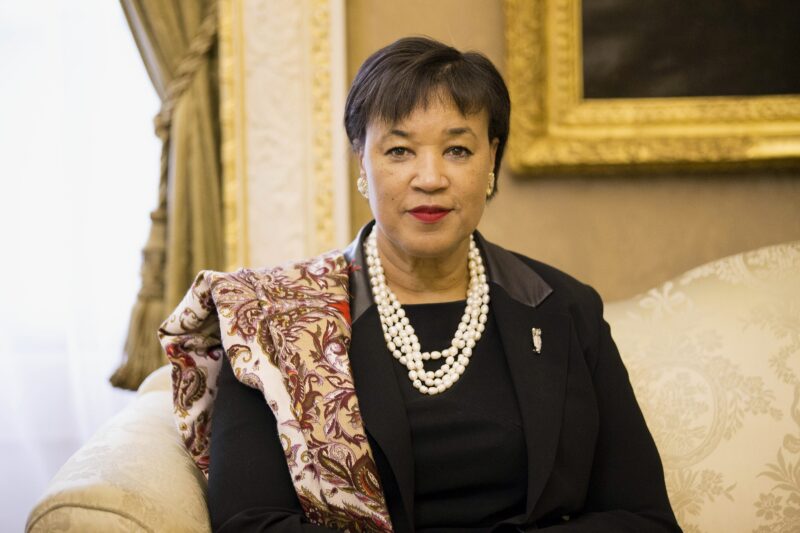Global Issues
COVID-19 debt relief must consider the vulnerabilities of small states -By Patricia Scotland
Similarly, the G20 has offered to temporarily suspend debt repayments for more than 70 countries classified as ‘least developed countries’ or which meet certain criteria under the World Bank International Development Association.

A lethal combination of disease, extreme climate events and economic crises is threatening the smallest and most vulnerable nations of the world. To tackle it, we must overhaul how we understand and address economic vulnerability.
The COVID-19 pandemic has already triggered a massive global recession. Meanwhile, a record number of super cyclones have wreaked havoc in Asia and the Pacific while the Caribbean braces itself for up to six major Atlantic hurricanes over the coming months.
There is good reason to feel anxious. When Hurricane Maria struck my native Dominica in 2017, it obliterated 226 percent of annual economic output, to say nothing of the emotional and psychological pain of having communities destroyed and lives lost. More recently, Cyclone Harold ploughed through Vanuatu, Tonga and Fiji, incurring US$750 million of damage, while exacerbating the risk of exposure to COVID-19.
Very often after hurricanes, countries must borrow heavily to rebuild their crippled economies, pushing them further into debt.
For the 32 disaster-prone ‘small states’ in the Commonwealth – most of whom have a population of 1.5 million or less – the reality is that COVID-19 profoundly compounds the ongoing risks they already face on a daily basis. Not only are they highly vulnerable to climate change and natural disasters, but their remote locations, high levels of debt, scant domestic markets and limited range of exports further expose them to other external shocks.
Within a few months, COVID-19 has ravaged their tourism industries, which contribute up to 50 per cent of national income in countries such as Maldives and Grenada, while slashing a fifth of vital remittance inflows. Overall, Commonwealth small states are set to lose 8.6 per cent of projected economic growth, with knock-on effects such as unprecedented levels of unemployment and disruption to social services.
Yet, despite the patent vulnerabilities they share, many small states are excluded from vital international financial support designed to help cope with COVID-19, including debt relief. This is due to outdated eligibility criteria based mainly on per capita income which classifies them as ‘middle’ or ‘high income’ countries, without fully taking into account their current challenges.
For example, the IMF has offered USD213.4 million worth of COVID-19 related debt relief to 29 of the poorest and most vulnerable nations. While commendable, the initiative will only benefit six of 54 Commonwealth countries – The Gambia, Malawi, Mozambique, Rwanda, Sierra Leone and Tanzania. It will not cover any of the 25 small island developing states in the Commonwealth, which remain prone to the existential threat of climate change.
Similarly, the G20 has offered to temporarily suspend debt repayments for more than 70 countries classified as ‘least developed countries’ or which meet certain criteria under the World Bank International Development Association. In this case, 30 Commonwealth countries are eligible, but a number of small vulnerable states such as Jamaica, Belize and Eswatini do not qualify because their average annual income per person is above the US$1,175 threshold, or they are deemed creditworthy enough to borrow from other funds.
So, while acknowledging these huge efforts of the global community to deal with the financial impacts of the pandemic, it is clear the nature and size of the support on offer is simply not enough.
Still, the extraordinary circumstances brought about by COVID-19 offer a rare opportunity to reform the international debt architecture so it is more fit-for-purpose.
Most urgent is that the moratorium on external debt repayments is extended to all developing countries – including small and vulnerable states classified as middle or high income – recognising their specific vulnerabilities.
The Commonwealth Secretariat’s ongoing work on a Universal Economic Vulnerability Index will also be vital. Still in development, this index aims to better capture different aspects of vulnerability – such as remoteness, economic exposure and proneness to natural disasters – rather than focus on per capita income alone.
We hope to build a consensus among our members on the definition and measurement of vulnerability, to help us better understand the needs of countries in crisis and propose the best solutions.
Without this altruistic approach to debt relief, many vulnerable countries are at a great risk of a debt crisis with alarming socio-economic impacts. We simply cannot afford to sit back and allow such a setback to human development.










